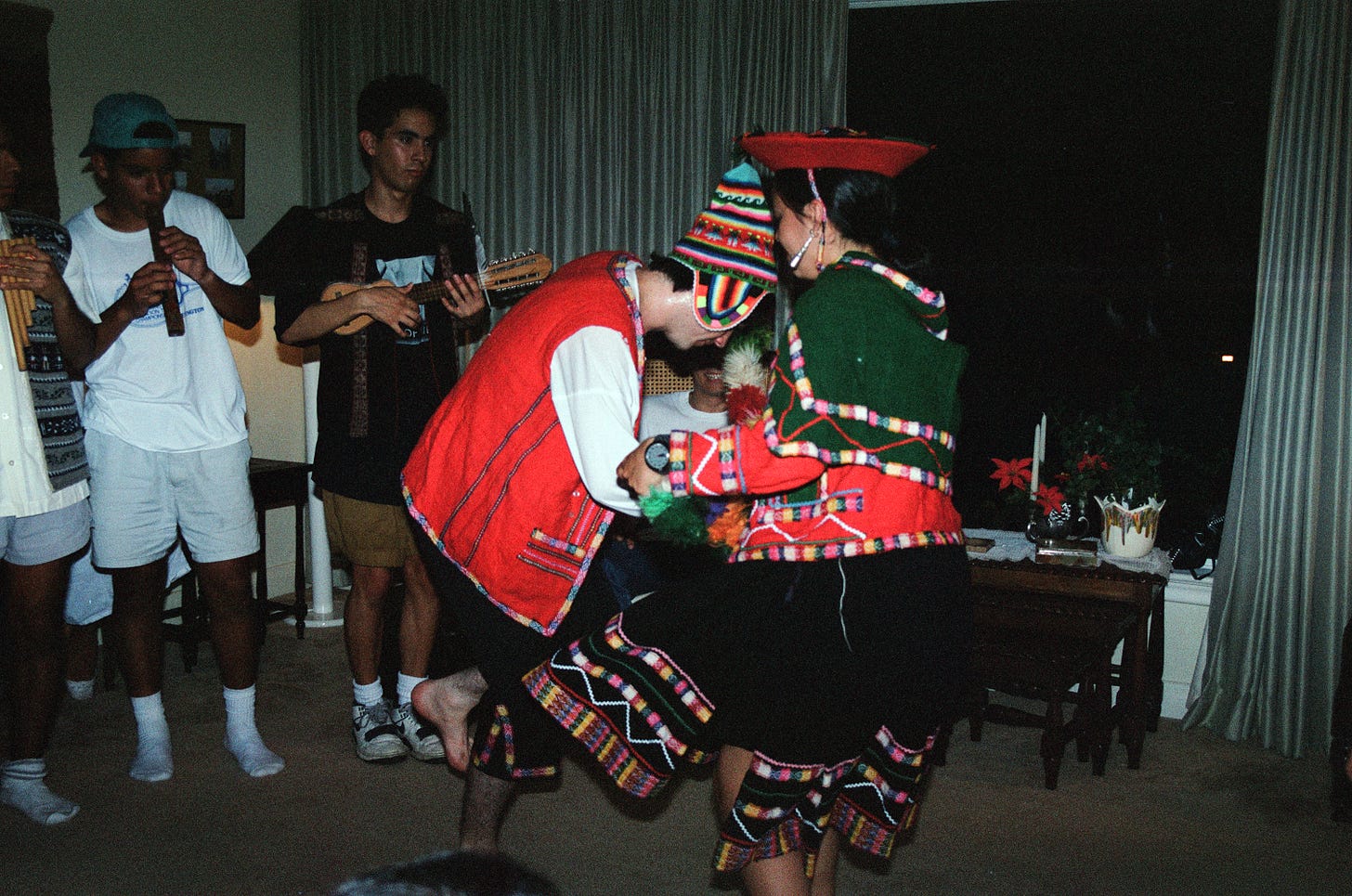¡Hola! This month’s newsletter celebrates Latinx Heritage Month. I take a look at the term Latinx and share how my Latinx experience intersects with cultural identity, immigration, and veganism. Learn about Latinx writers, chefs, and podcasts, and listen to a Quechua rap song.
300 Millones en Español
Our family tradition of watching 300 Millones every Sunday night in the late 1970s forged one of my earliest memories of Latinx identity. Radio y Television Española broadcast the show to Spanish speaking countries around the globe, and the show’s title represented the world’s Spanish speaking population of 300 million.
The opening montage had us cheering when we saw animated Peruvian folk dancers, and for an hour we celebrated what it meant to be Latinx via music, news, interviews, and contests. It made us proud of our ancestry and we felt connected to the cultures of South America, Central America, and the Caribbean.
Latinx, Latino, or Hispanic?
Officially, it’s Hispanic Heritage Month, but I prefer calling it Latinx Heritage Month. The term Latinx is more gender inclusive than the binary Latino (masculine) or Latina (feminine). And the term Hispanic has strong colonial ties to Spain, while Latinx includes Indigenous people, such as the Quechua in Peru’s Andes.
According to NPR’s Yes, We're Calling It Hispanic Heritage Month And We Know It Makes Some Of You Cringe the term Latinx is rising in popularity among young people, academics, and corporations. But it’s important to acknowledge that outside of the U.S., the term Latinx doesn't make linguistic sense in Spanish.
Preserving Cultural Identity
One of the challenges immigrants face in a new country is preserving their cultural identity. My Peruvian parents have been immigrants most of their lives, and preserved their cultural identity through food, music, art, literature, language, and religion. Thanks to my parents, I learned how to preserve my cultural identity as well.
The long-form essay for Huellas Magazine, Preserving Peruvianism in the Quinto Suyo, is about my parents’ expat experience. One of my favorite parts of the story is seeing where my parents lived as children, in Lima’s working class tenements with families of Andean, Chinese, Japanese, Italian, or Afro-descendant heritage.
Vegan While Latinx
For my story, A Stuffed Avocado for Every Century, I interviewed Andrea Aliseda about some early avocado recipes in Mexican cuisine. Since then, we have been chatting about what it means to be vegan and Latinx. We are planning to continue the conversation on Instagram live in November, stay tuned for a date announcement.
For many families in Latin America, traditional dishes with animal protein are a strong part of their culture. So after turning vegan, I thought I would loose my identity if I could no longer eat or cook the food I grew up with. Our conversation will explore the question, “Can you be vegan and keep your Latinx identity?”
Latinx Writers, Chefs, and Podcasts I Follow
These inspiring writers and chefs that I follow on Instagram redefine what it means to be Latinx and vegan today:
Jocelyn Ramirez promotes plant-based Mexican cooking through her cookbook La Vida Verde and New York Times recipes.
Andrea Aliseda explores her roots through history, stories, and recipes focused on plant-based and decolonized Mexican food.
Evanice Holz adapts Cuban recipes from her immigrant family and is an advocate for food justice and equity in Latinx communities.
Luz Calvo and Catriona Rueda Esquibel co-authored Decolonize Your Diet, healing plant-based Mexican-American recipes with ancestral ingredients.
Eddie Garza is reshaping food systems in Latinx communities through Indigenous education and recipes that are plant-centric.
And these podcasts amplify stories about the Latinx experience:
Radio Ambulante is an NPR podcast that tells uniquely Latin American stories.
Latino USA covers cultural, political and social experiences of Latinos. One of my favorites episodes is about the word “cholo,” and how it means different things to a Mexican-American and a Peruvian from the Andes.
Projecto Pulso brings you untold stories and unheard Latino voices. They interviewed me about decolonizing food as a vegan Peruvian chef.
Peruvians of USA shares the diversity of the Peruvian immigrant experience.
La Yapa: The Latinx Project at NYU explores Latinx identities and promotes art, cultures, and scholarship through its interdisciplinary programs.
Musica Andina / Quechua Rap
An Indigenous woman from Peru’s Andes, Renata Flores sings in her native language, Quechua. But instead of traditional Andean rhythms like Huayno she performs in a style that’s more like rap or hip hop. In the song Tijeras, she calls for Indigenous women to unite against social injustice.
La Yapa: Peru’s Queen of Quechua Rap Wants to Rescue Indigenous Culture With Her Music, The New York Times.





Hi Nico -- Thanks for the list of resources above! There is so much good in the world and people doing inspiring work to read up on, even though it doesn't feel like it much lately. A big thank you for the reminder. I'm so glad to keep up with your work!